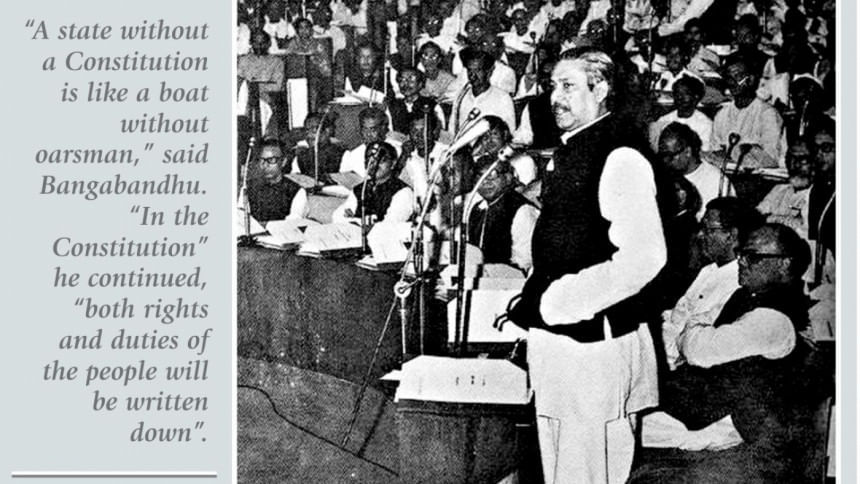BANGABANDHU on the Constitution

It was 12 October 1972. Bangabandhu Sheikh Mujibur Rahman took the floor to talk about the [draft] Constitution for newly independent state – Bangladesh. The morning session of the Constituent Assembly was chaired by Mahmudullah. He just replaced Shah Abdul Hamid, the first Speaker of the Constituent Assembly. Hamid, the eldest parliamentarian, was elected as the first Speaker in the first meeting of the Constituent Assembly on 10 April 1972. The session was presided over by Mawlana Abdur Rashid Tarkabagish.
His was a speech based on the [political] experiences that he went through. The draft was yet to place on the table for general discussion. The Constitution Drafting Committee, headed by Dr. Kamal Hossain, took 72 days to draft the Constitution – much less time than India and Pakistan took– and therefore, got praise from Bangabandhu. He was,on the one hand, overwhelmed to write a Constitution for a nascent state; on the other hand, he was disconsolate in regards to the genocide committed by the Pakistani military. He put the members of the Constituent Assembly in mind of the struggle that led to the independence, and of the people who sacrificed their lives for the independence since 1952. For Bangabandhu, independence of Bangladesh was an outcome of long struggle, unlike nine-month war.
The struggle began with the legitimate demand for Bangla as a 'state language' for Pakistan, “Bangla, the mother tongue of the people of East Pakistan, was denied to be a state language in the proposed 1948 Constitution of Pakistan. People, mostly students sacrificed their blood to establish the status of their mother tongue as the state language.”
Bangabandhu informed the house of the political upheavals of his days: “in 1954 the legitimate government of AK Fazlul Huq was dismissed to eliminate the leaderships from East Bengal. With many others fellows, I was arrested. Then came the 1958 movement for self-governance, which turned to a mass movement in 1969 against the Agartala Conspiracy. Then 1971. In all movements, Bangalee had to sacrifice their blood.” To Bangabandhu, the independence came out with the blood of the millions of people, and the Constituent Assembly was going to write a Constitution with the blood of those martyrs.
But why, and what for this Constitution? “A state without a Constitution is like a boat without oarsman,” said Bangabandhu. “In the Constitution” he continued, “both rights and duties of the people will be written down”. He then sought to explain the fundamental principles on which the edifice of the Constitution was to build on – Bangalee nationalism, democracy, socialism, and secularism.
For him, the culture, the tradition and the sky of Bengal formed the “Bangalee Nationalism”. People's right to choose their representative was the keystone for democracy to him, “I believe in democracy, I believe in the people's right to vote”, said Bangabandhu.
“We believe that there will be no social disparity here”, he continued, “the capitalist class will no longer be allowed to oppress the people of this country; the people of this country cannot live their lives without socialism. That is why the economy will be socialistic.” – The 'Third World Charismat' reiterated.
To him, secularism was not the absence of religion in the state, it was the absence of state-religion instead. For him, it was a platform for religious groups to live together with their respective beliefs. Secularism was to understand inclusion, unlike exclusion of religion from the state: “Secularism does not mean the absence of religions. Muslim, Hindu, Buddhist, Christian will perform their own religion. None will be allowed to suppress other's religion. The people of Bengal never liked religious overpowering.” However, he warned that religion cannot be used for political gain. “I believe that the people of Bengal will reject those who would try to use religion for political gain,” Bangabandhu reiterated.
To Bangabandhu, Constitution was the directions for the future generations. For him, the Constitution of Bangladesh was written by the blood of the martyrs.
The writer is a Ph.D. candidate at the National University of Singapore (NUS). This write-up is based on the speech of Bangabandhu Sheikh Mujibur Rahman delivered in the Constituent Assembly 1972.

 For all latest news, follow The Daily Star's Google News channel.
For all latest news, follow The Daily Star's Google News channel. 



Comments